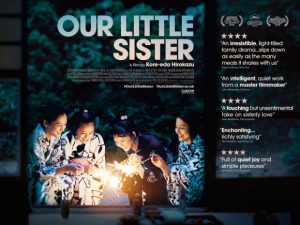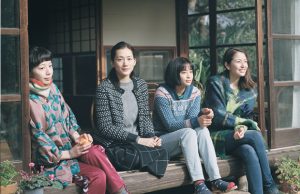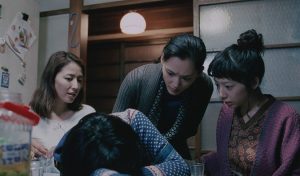
Hirokazu Koreeda’s “Like Father, Like Son” was a heartbreaking drama dealing with a big issue: two children switched at birth. After years of living with their believed parents, the children are swapped to their true genetic kin, with commentary on class warfare lying beneath the surface. The child of a softer family struggles with a loving but incredibly strict family unit, while the other child takes a while to adapt to a more care-free surrounding. It was an emotional rollercoaster of a film, a masterpiece no doubt!
“Our Little Sister,” Koreeda’s follow-up, is the polar opposite. It deals with heavy issues, such as death, divorce, and bankruptcy, but goes about it in a genial and lighthearted way. Not so much that it diminishes the severity of the issues; just in that its approach is more understated. I’d go so far as to say more humane, but that would denote “Like Father, Like Son’s” humanity, which that film had a lot of, just in a different light. While that film was tackling one gigantic issue under a microscope, this film is juggling multiple complications, all of which are more relatable.

The direction of the film is pleasant throughout. Almost too pleasant at times, with certain issues being resolved too easily. Fights over relationships and parental decisions are resolved rather quickly and calmly. It almost seems like fantasy. What keeps it from entering that territory is Koreeda’s keen sense of humanity. Once I let my guard down, I realized that most of the resolutions are true to how most would react in the situation: a sudden outburst followed by an eventual cool down. The pacing speeds right to the cool down position, missing the tension in between, which explains why it almost feels unreal. And yet, it is. I think to a work-related situation I had recently, one that could’ve had massive consequences had it not turned out alright. In stressing over the phone to a friend, she later stated I was adorably upset. A year prior, another work-related situation resulted in an angrier side of me being unleashed, a burst of verbal rage that wouldn’t be deemed adorably upset. Koreeda captures both of these emotions, sometimes in the same breath, but always authentic.
The main story is of major severity. It’s centered on the ripple effects of the death of a father of three sisters, Sachi (Haruka Ayase), Yoshino (Masami Nagasawa), and Chika (Kaho). They discover a fourth sister, Suzu (Suzu Hirose), born to the mistress he left their mother for. The three, led by the responsible Sachi, agree to adopt her into their grandmother’s lavish home, lovingly referred to as a dormitory (with Sachi the dorm mother). No conflict arises from this situation, only slices of life.

Koreeda is more concerned with observing the normalcy of life than he is in concocting a scenario in which to draw hefty dramatics from. This explains the difference in tone from “Like Father, Like Son,” even though both are just as humane. The bigger issues, such as Sachi’s affair with a married doctor, Yoshino’s involvement in the possible foreclosure of a favored restaurant, and the serious nature of taking in Suzu (from a mother she dislikes, no less) are handled genteelly. Serious discussion is brought forth from them, but no big fights. This is as pleasant and safe as the remake of “Pete’s Dragon.”
The film does run into a wall because of this approach. The direction tends to meander at times, getting lost in the beauty of life (complemented by the exquisite cinematography by Mikiya Takimoto). Never before has a film hosted multiple funerals and felt lighthearted in those situations. It may be a balmy experience, but it was in desperate need of despondence at times to bolster the empathy. This would’ve also aided in getting the film to a finish with clarity, as opposed to drifting softly to a conclusion after an endless parade of tying up loose ends.

It’s easy to get caught up in the geniality of “Our Little Sister.” It’s a rarity to see a film this amiable, a nice change of pace. The simplicity of young love and the complications of romance are easy to digest both in tenderness and relatability. The deep-seated hatred the sisters have for their parents may be sugarcoated, but still feel real and deserved. The film isn’t the gut punch that “Like Father, Like Son” was, but it’s not aspiring to be. It aspires to be a warm slice of life and it succeeds in doing so.
Final Rating: B
